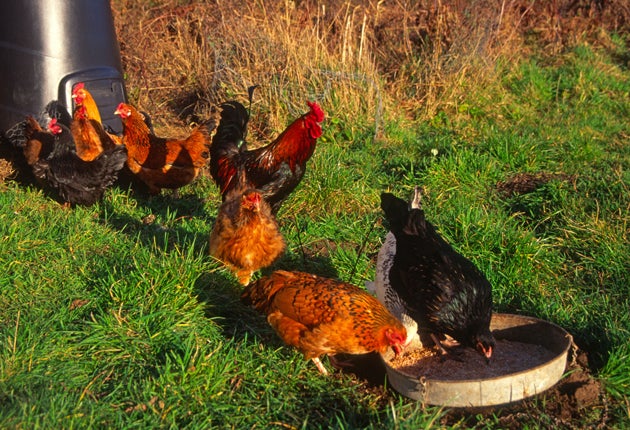Belgians egged on to keep chickens – but they're not for eating
Hen-rearing craze takes hold after drive to reduce household waste

In a garden dotted with daffodils overlooking open fields, a trio of English Sussex hens strut their stuff. Two small boys stroke their resplendent white and black plumage while feeding them. The youngest child takes advantage of the diversion to dive into the birds' dark-red wooden coop to play hide-and-seek.
"We get two eggs every day, which go towards making pancakes," says Tibo Duijsters, a blond eight-year old, as he scatters grain around the ground.
Their father Michel Duijsters points proudly to his fast-disappearing compost heap. Most of the food scraps and vegetable peelings have been eaten by the hens.
The Duijsters and many of their neighbours in Dilsem-Stokkem, a small town of neat detached houses a few miles from Belgium's border with the Netherlands, have no agricultural background or training in poultry farming. But they have joined a chicken-rearing craze which has taken hold with tens of thousands of hens now living in coops in family gardens.
The boom is thanks to own-a-chicken schemes launched by the Belgian authorities in a bid to cut down on household waste. In the region of Limburg, near the Dutch border, more than 2,500 families adopted hens just last year, a 306 per cent rise on the previous year. There have been similar successes in other parts of the country.
The Duijsters family were egged on by a marketing campaign by the authorities, which also subsidises the cost of buying the hens. One hen only costs around €4 (£3.50), but comes with expectations.
"We expect owners to look after them properly and provide a lot of reading material for them to go through," said Annick De Paepe, an official with the Limburg regional authority.
"It's been a huge success and it's proving ever more popular". She believes the boom has been fuelled by the recession. "There is very much a mood of getting back to nature right now and people love picking up their own eggs from the garden. But it's also a great way to cut down on household waste as the chickens will eat any leftovers and cut organic waste by half."
"So far, we haven't had any bad experiences, but of course, we can't be sure that people aren't just throwing them into the oven. Not everyone wants to take on a chicken for life."
Mr Duijsters, a civil servant, leads the twice-daily feeding round and says the hens have become part of the family. "They look so lovely and they do all have their own personalities. They get very impatient if they don't get fed on time and come pecking at the windows to complain.
"But it's nothing unusual around here. Everyone seems to own hens, it's the thing to do"
In the Flemish regions of Belgium, authorities typically apply a stringent approach to ensuring the well-being of the chickens.
"We have proper training courses in rearing and feeding the hens and we watch out for anyone who might not be suitable," said Christophe Deneve, who recently launched a chicken scheme in Mouscron.
The town, a stone's throw from the Belgian-French border, is distributing 50 pairs of chickens for free to families with sufficient space to keep the birds in their gardens.
But anyone who takes part has to agree not to eat the chickens for at least two years, or give them away.
Join our commenting forum
Join thought-provoking conversations, follow other Independent readers and see their replies
Comments